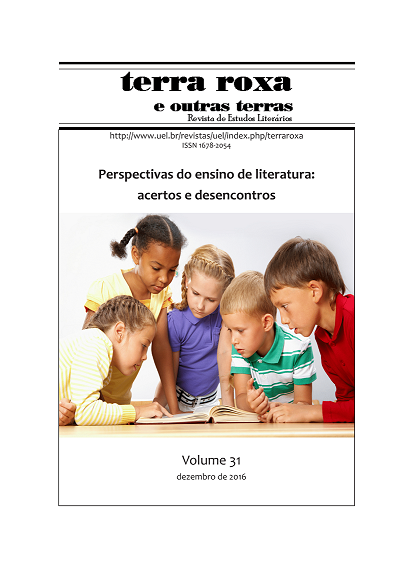The cordel orality of the literature teaching
DOI:
https://doi.org/10.5433/1678-2054.2016v31p94Keywords:
Cordel literature, Community of readers, PerformanceAbstract
This article presents a proposal for a cordel literature (sung folk novels) by reading practice in the classroom, combining the lyrical specificities of texts and literature teaching. The method employed comprises concepts of “subjective reading,” by Anne Rouxel, and “performance”, by Paul Zumthor to propose a practice that valorizes critical and creative reception of the reader in the dramatized reading process. As corpus, we use Antônio Carlos de Oliveira Barreto’s texts, a Bahian singing poet that brings social reflections in their texts. In the process of reading, we experience the access to the game through aesthetic experience with orality and musicality produced by shared reading.Downloads
References
BARRETO, Antônio Carlos de Oliveira. Mestre Bimba. Salvador: Akadicadikum, 2011.
BRANDÃO, Helena & Guaraciaba MIchiletti. Aprender e ensinar com textos didáticos e paradidáticos. São Paulo: Cortez, 1997.
CASCUDO, Luis da Câmara. Literatura oral no Brasil. 3. ed. São Paulo: Edusp, 1984.
GALVÃO, Ana Maria de Oliveira. Cordel: leitores e ouvintes. Belo Horizonte: Autêntica, 2010.
GIROUX, A. Henry & Peter McLaren. “Cultura popular e pedagogia crítica: a vida cotidiana como base para o conhecimento curricular”. In: Antonio Flávio Moreira & Tomaz Tadeu, (orgs.). Currículo, cultura e sociedade. São Paulo: Cortez, 2013. p. 93-124.
GOMES, Carlos Magno. “Leitura e estudos culturais”. Revista Brasileira de Literatura Comparada (São Paulo), n. 16, p. 25-44, 2010.
GOMES, Carlos Magno. “O modelo cultural de leitura”. Nonada (Porto Alegre), n. 18, p. 167-183, 2012. Disponível em http://seer.uniritter.edu.br/index.php/nonada/article/download/572/362. Acesso em: 10 jun. 2016.
GOMES, Nilma Lino. A mulher negra que vi de perto. Belo Horizonte: Mazza, 1995.
HALL, Stuart. Da diáspora: identidades e mediações culturais. Trad. Adelaine La Guardiã Resende et al. Belo Horizonte: Ed. UFMG, 2003.
MARINHO, Ana Cristina & José Hélder Pinheiro Alves. O cordel no cotidiano escolar. São Paulo: Cortez, 2012.
ONG, Walter Jackson. Oralidade e cultura escrita. Trad. Enid Abreu Dobranszky. São Paulo: Papirus, 1998.
PINO, Angel, Adair de Aguiar Neitzel & Luciane Maria Schlindwein. “O poema na formação estética de professores: a experiência com os haikais”. In: Angel Pino, Luciane Maria Schlindwein & Adair de Aguiar Neitzel, (orgs.). Cultura, escola e educação criadora: formação estética do ser humano. Curitiba: CRV, 2010. p. 127-142.
ROUXEL, Annie. “Apropriação singular das obras e cultura literária”. In: Annie Rouxel, Gérard Langlade e Neide Luiza de Resende, (orgs.). Leitura subjetiva e ensino de literatura. São Paulo: Alameda, 2013. p. 165-189.
ROUXEL, Annie. “Ensino da literatura: experiência estética e formação do leitor”. José Helder Pinheiro Alves, (org). Memórias da Borborema 4. Campina Grande: Abralic, 2014. p. 19-36.
SCHLINDWEIN, Luciane Maria. “Arte e desenvolvimento estético na escola”. In: Angel Pino, Luciane Maria Schlindwein & Adair de Aguiar Neitzel, (orgs.). Cultura, escola e educação criadora: formação estética do ser humano. Curitiba: CRV, 2010. p. 31-50.
SILVA, Ezequiel Theodoro da. Criticidade e leitura: ensaios. São Paulo: Global, 2009.
SOUZA, Ana Lúcia Silva. Negritude, letramento e uso social da oralidade. In: Eliane Cavaleiro, (org.). Racismo e antirracismo na educação: repensando nossa escola. São Paulo: Selo Negro, 2001. p. 179-194.
VIGOTSKI, Lev. Psicologia da arte. Trad. Paulo Bezerra. São Paulo: Martins Fontes, 1998.
ZUMTHOR, Paul. Performance, recepção, leitura. Trad. Jerusa Pires Ferreira e Suely Fenerich. São Paulo: EDUC, 2000.
ZUMTHOR, Paul. A letra e a voz. São Paulo: Companhia das Letras, 1993.
ZUMTHOR, Paul. Escritura e nomadismo: entrevistas e ensaios. Trad. Jerusa Pires Ferreira e Sonia Queiroz. Cotia: Ateliê Editorial, 2005.
ZUMTHOR, Paul. Introdução à poesia oral. Trad. Jerusa Pires Ferreira, Maria Lúcia Diniz Pochat e Maria Inês de Almeida. Belo Horizonte: Ed. UFMG, 2010.
Downloads
Published
How to Cite
Issue
Section
License
Authors who publish in this journal agree to the following terms:
a) The authors retain the copyright and grant the journal the right of first publication, the work being simultaneously licensed under the Creative Commons Attribution-NonCommercial 4.0 International License, allowing the sharing of the work with acknowledgment of the authorship of the work and initial publication in this journal.
b) Authors are authorized to assume additional contracts separately, for non-exclusive distribution of the version of the work published in this journal (eg, publish in an institutional repository or as a book chapter), with acknowledgment of authorship and initial publication in this journal.
c) Authors are allowed and encouraged to publish and distribute their work online (e.g. in institutional repositories or on their personal page) after the editorial process, as this can generate productive changes as well as increase impact and citation of the published work (See The Effect of Open Access).
d) The authors of the approved works authorize the journal to, after publication, transfer their content for reproduction in content indexers, virtual libraries and the like.
e) The authors assume that the texts submitted for publication are of their original creation, taking full responsibility for their content in case of any objection by third parties.



















